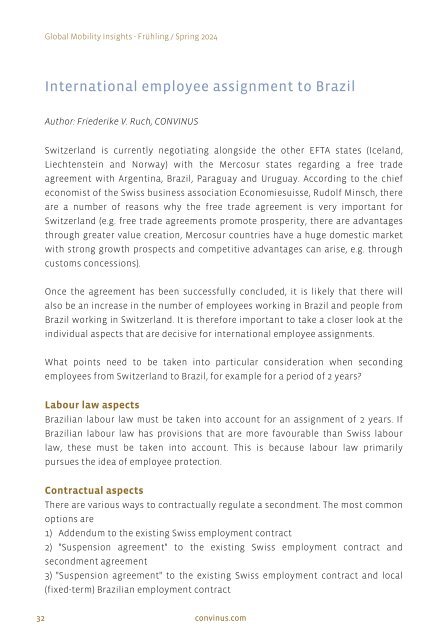Global Mobility Insights NEWSLETTER Frühling / Spring 2024
Create successful ePaper yourself
Turn your PDF publications into a flip-book with our unique Google optimized e-Paper software.
<strong>Global</strong> <strong>Mobility</strong> <strong>Insights</strong> - <strong>Frühling</strong> / <strong>Spring</strong> <strong>2024</strong><br />
International employee assignment to Brazil<br />
Author: Friederike V. Ruch, CONVINUS<br />
Switzerland is currently negotiating alongside the other EFTA states (Iceland,<br />
Liechtenstein and Norway) with the Mercosur states regarding a free trade<br />
agreement with Argentina, Brazil, Paraguay and Uruguay. According to the chief<br />
economist of the Swiss business association Economiesuisse, Rudolf Minsch, there<br />
are a number of reasons why the free trade agreement is very important for<br />
Switzerland (e.g. free trade agreements promote prosperity, there are advantages<br />
through greater value creation, Mercosur countries have a huge domestic market<br />
with strong growth prospects and competitive advantages can arise, e.g. through<br />
customs concessions).<br />
Once the agreement has been successfully concluded, it is likely that there will<br />
also be an increase in the number of employees working in Brazil and people from<br />
Brazil working in Switzerland. It is therefore important to take a closer look at the<br />
individual aspects that are decisive for international employee assignments.<br />
What points need to be taken into particular consideration when seconding<br />
employees from Switzerland to Brazil, for example for a period of 2 years?<br />
Labour law aspects<br />
Brazilian labour law must be taken into account for an assignment of 2 years. If<br />
Brazilian labour law has provisions that are more favourable than Swiss labour<br />
law, these must be taken into account. This is because labour law primarily<br />
pursues the idea of employee protection.<br />
Contractual aspects<br />
There are various ways to contractually regulate a secondment. The most common<br />
options are<br />
1) Addendum to the existing Swiss employment contract<br />
2) "Suspension agreement" to the existing Swiss employment contract and<br />
secondment agreement<br />
3) "Suspension agreement" to the existing Swiss employment contract and local<br />
(fixed-term) Brazilian employment contract<br />
32<br />
convinus.com


















